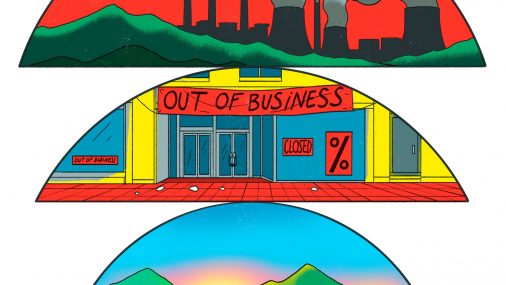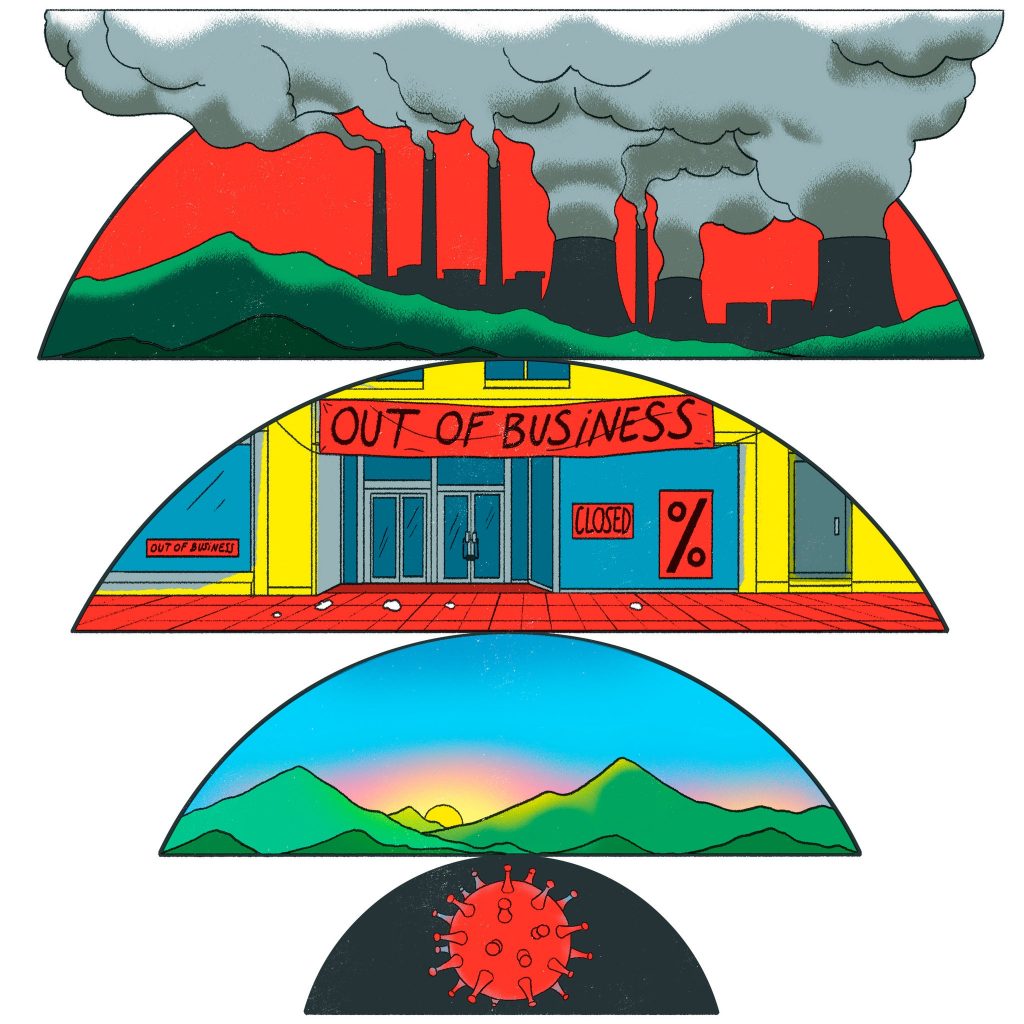
Lockdowns and distancing won’t save the world from warming. But amid this crisis, we have a chance to build a better future.

Something strange is happening. Not just the illness and death sweeping the planet. Not just the closing of borders and bars and schools, the hoarding of wipes and sanitizer, the orders — unimaginable to most Americans weeks ago — to “shelter in place.” Something else is afoot. In China and Italy, the air is now strikingly clean. Venice’s Grand Canal, normally fouled by boat traffic, is running clear. In Seattle, New York, Los Angeles, Chicago and Atlanta, the fog of pollution has lifted. Even global carbon emissions have fallen.
Coronavirus has led to an astonishing shutdown of economic activity and a drastic reduction in the use of fossil fuels. In China, measures to contain the virus in February alone caused a drop in carbon emissions of an estimated 25 percent. The Center for Research on Energy and Clean Air estimates that this is equivalent to 200 million tons of carbon dioxide — more than half the annual emissions of Britain. In the short term, response to the pandemic seems to be having a positive effect on emissions. But in the longer term, will the virus help or harm the climate?
To be clear, the coronavirus pandemic is a tragedy — a human nightmare unspooling in overloaded hospitals and unemployment offices with unnerving speed, barreling toward a horizon darkened by economic disaster and crowded with portents of suffering to come. But this global crisis is also an inflection point for that other global crisis, the slower one with even higher stakes, which remains the backdrop against which modernity now plays out. As the United Nations’ secretary general recently noted, the threat from coronavirus is temporary whereas the threat from heat waves, floods and extreme storms resulting in the loss of human life will remain with us for years.
Our response to this health crisis will shape the climate crisis for decades to come. The efforts to revive economic activity — the stimulus plans, bailouts and back-to-work programs being developed now — will help determine the shape of our economies and our lives for the foreseeable future, and they will have effects on carbon emissions that reverberate across the planet for thousands of years.
How hopeful you feel about the direction this response is taking may depend on how long ago you refreshed your news feed. Just last week (which feels like a hundred years ago), a friend suggested that there may be a sort of Freudian transference from coronavirus to climate — that the fear and sense of urgency will be lifted from the faster-moving crisis and settle on the slower one, becoming a catalyst for much-needed action. So far, it seems any transference is working in the opposite direction: Lockdowns and social distancing are providing a litany of necessary actions ripe for the transferal of nebulous climate anxieties and fears. In this context, consumerism perversely provides some relief — you can finally go buy dry goods to prepare for the apocalypse.
But personal consumption and travel habits are, in fact, changing, which has some people wondering if this might be the beginning of a meaningful shift. Maybe, as you hunker down with cabinets full of essentials, your sense of what consumer goods you need will shrink. Maybe, even after the acute phase of the coronavirus crisis has passed, you will be more likely to telecommute. Lifestyles that include, for example, frequent long-distance travel already seem ethically questionable in light of the climate crisis, and, in an age irrevocably scarred by pandemic, these lifestyles may come to be seen as grossly irresponsible. Maybe among the relatively wealthy, jumping on a plane for a weekend away or for a destination wedding will come to seem unthinkable.
Sweeping changes in individual habits — particularly in wealthy countries with high per capita consumption — could lead to lower emissions, which would be an unequivocal good. But personal habits may matter less because of direct reductions in carbon emissions and more because of “behavioral contagion,” a term from the social sciences that refers to the way ideas and behaviors spread through a population and can, in terms of climate action, lead to changes in voting and even policy.
Which is to say, in order to be meaningful for global emissions, changes in consumption habits as a result of the virus would need to extend beyond individuals to the larger structures that shape our lives. In China, it wasn’t telecommuting or grounded planes that led to the 25 percent drop in emissions. It was the abrupt halt of industrial manufacturing. (The concept of the “personal carbon footprint” was popularized by BP in a 2005 media campaign costing over $100 million — a campaign that, research has indicated, deflected responsibility for climate change away from the corporation and onto the individual consumer.) This is not to say that personal consumption is meaningless — a significant reduction in air travel could decrease aviation emissions. But aviation accounts for only about 2.5 percent of global emissions, an amount that looks downright puny in the shadow cast by heavy industry.
If anything, the short-term positive effects on the climate that we’re seeing today serve as a dramatic reminder that changing personal consumption habits will mean very little going forward if we also fail to decarbonize the global economy.
Read more on The New York Times
 Previous Article
Previous Article Next Article
Next Article















